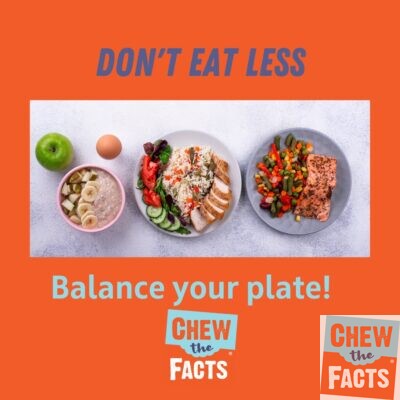
Weight management is an important part of staying healthy, preventing disease (diabetes, high blood pressure, heart disease) and feeling good. However, weight loss is much more challenging for some than others. Most registered dietitians agree that what used to be considered as “normal body weight parameters” are often unrealistic. There is a huge push against what some call “diet culture” – the culture that primarily pressures women to continuously attempt unhealthy weight loss strategies as way to achieve thinness. This culture values smaller body sizes and disordered eating behaviors.
Rethinking Weight and Health
If you have been struggling with your eating habits, exercise or weight, you aren’t alone. Keep in mind there are many measures of health beyond the number on the scale. There is value in maintaining your weight and improving your fitness. The quality of your diet can also have a positive impact on your health, regardless of your weight. are struggling with trying to The holidays can be a wonderful time to spend with family and friends, and often food is the focus of many occasions.
As a registered dietitian, I have never prescribed very low calorie diets, not over-restriction of calories. However I recognize body weight as a factor in some disease processes, and I know that many people want support to feel at their best.
Restrictive Diets Aren’t the Answer
Unfortunately a billion-dollar diet industry has been promoting restrictive weight loss diets and other products that are not in the interest of your health. There are many disreputable supplement or fitness companies that sell weight loss supplements or promote very restrictive diet principles for the purpose of making a lot of money. It doesn’t work. And often, causes long-term harm, creating unhealthy relationships with eating and food.
You can enjoy your favorite foods and enjoy better health. It begins with a healthy relationship with food, and an understanding that you need to eat to be well. If you begin treating special occasions or holidays like every other day, you will find food freedom.
Honor your hunger – including special occasion days
Skipping meals or starving yourself on the day of a special event is definitely a NO. Instead, honor your hunger. Eating normally on the day of a special occasion normalizes everyday eating. If you don’t eat enough during the day, you may feel out of control at the party, overeat, then feel uncomfortable. Enjoy a balanced breakfast, and perhaps a lower carb lunch and dinner, so you’ll have room for desserts or other special treats at the party.
Don’t skip meals
On days you know you have a special dinner or party coming up, keep the whole day balanced. Don’t skip meals. Instead plan balanced meals that include both protein and some fruits and veggies (which may be missing at the party buffet). For breakfast plan some oatmeal with peanut butter, an egg and a slice of whole grain toast (or an egg sandwich), or a fruit and Greek yogurt bowl with granola. For lunch and dinner heat up some leftovers, enjoy a salad or a half a sandwich with vegetable soup of a power bowl with cottage cheese, tuna, and fruit.
Use balance as a visual
A balanced plate looks like this – a protein, a vegetable, a fruit, balanced out with a grain or starch. Why add the protein and veggie first? Because they are often what’s missing at the end of the day. In addition, research shows that spreading your protein sources out through the day (as opposed to eating it mostly at one meal) supports muscle retention. Shoot for 20-30 grams of protein at each meal.

Eat more fruits and veggie
This is a goal to strive for every single day, including when you are in the buffet line at parties. Most parties will include a vegetable platter or some fresh fruit. Add good portions to your plate and you’ll be sure to get the fiber you need. They will fill you up, and help you control your portions of other higher calorie snacks. In addition, make sure to grab an apple or a snack bag of carrots on your way out the door to work or for a shopping trip, to help keep hunger at bay while your’e busy.
Be mindful of portions, and slow down.
It’s not what you are eating as much as it is “how and how much”. You want to savor your food, not rush through it. Take your time. Stay mindful while enjoying every bite. Take notice of what is being served from the buffet at parties. Make a mindful choice to choose a balance plate or smaller portions. If it’s a family style dinner, take a small portion of all of your favorites and put your fork down in between bites. If you find yourself grabbing food out of boredom or anxiety, step away from the buffet table, grab a glass of sparkling water and enjoy visiting with guests.
Stay hydrated.
Colder weather, and busier schedules, can sometimes get you out of your water drinking routine. Be sure to drink enough water every day through the day. At parties, be sure to monitor your alcohol intake. The recommendation for alcoholic drinks is nor more than one serving per day for women and no more than two for men. As a holiday party may be a special time, consider limiting it to 1-3 cocktails per occasion (and never drink alcohol on an empty stomach).
Don’t “unschedule” your exercise.
The holidays are stressful. This is not the time to let anything interfere with your exercise schedule. So be sure to make time to fit in at least 3-4 days of exercise (20-minutes or more) every week.
Get support.
If you are struggling with your body image or eating habits, get support. Find a certified counselor and speak with a registered dietitian (RDN) who specializes in eating disorders. Enlist a trusted friend to help get you through tough times.





